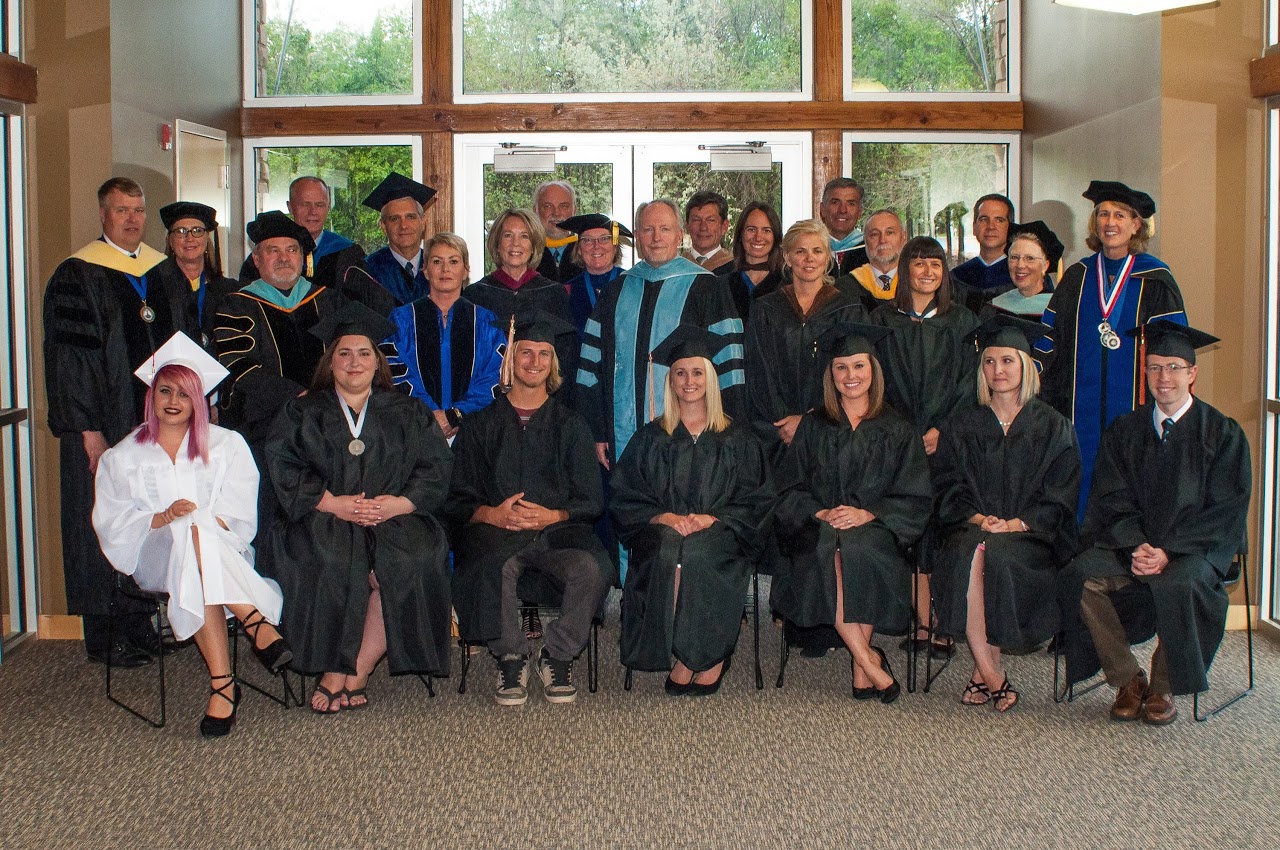Spring has brought an end to the long endeavors, and opened up new beginnings, for Utah State University-Moab’s latest graduates.
Family and community members joined the eight students at the Grand Center on Thursday, April 28, to celebrate their achievements. Two students graduated with associate’s degrees, and six others obtained bachelor’s degrees in different areas of study.
All are eager to take the next leap into a bright future, USU-Moab Dean Steve Hawks said.
“Most students are working adults in their 30s,” Hawks said. “It’s a big deal to commit to a degree program when you’ve got other life responsibilities well under way.”
Many students go to other cities and states to begin their education, and return with transferable credits or full associate’s degrees to complete everything in Moab not many years later, Hawks said.
This year’s Student of the Year, Moab resident Sara Hirschfeld, might embody the school’s average graduate.
Hirschfeld initially attended colleges in Nebraska and Arizona. She went on to the University of Utah for a year after she earned her associate’s degree, but when an illness forced her to stop attending classes, she returned home to recover.
After nearly a year out of university, Hirschfeld was working full time and considered the possibility of not completing her degree. Thanks to the evening class offerings at USU-Moab, however, once she looked into taking her final coursework, she realized that a degree in business administration was well within reach, she said.
“It really didn’t make sense not to, because I could finish without taking time away from anything else,” she said.
If there is one word to define her college education, she said, it’s perseverance.
Utah State University Chief of Staff and Secretary to the Board Sydney Peterson traveled from the school’s Logan campus to address the graduates, applauding them for that kind of persistence.
She also encouraged them to keep their eyes open for continuing opportunities to enrich their lives.
“You have responded to one great opportunity already,” Peterson said. “The opportunity to obtain an education in Moab.”
The campus in Moab was established in 1968 by a legislative mandate.
In the early days, a handful of faculty members flew to Moab from USU’s Logan campus. Over time, Internet and satellite communication made it possible for the university’s offerings in Moab to expand to include 18 to 20 bachelor’s degrees, 15 master’s degrees and one doctoral degree.
In the last eight years or so, under the leadership of outgoing USU President Stan Albrecht, the Moab campus has expanded to four buildings, five full-time faculty members, four full-time staff members, an ever-growing number of degree programs and a student body that has tripled to 150 students, Hawks said.
A champion of the regional campus system envisioned by the founders of the land grant university system, Albrecht has put access to higher education at the top of his agenda, Hawks said.
“Many of our students are here studying things that are unique to Moab,” Hawks said. “Moab is a unique setting, attracting 2 million tourists every year, and provides unique opportunities to see and interact with geology.”
This year’s graduates spanned nearly every college represented at the Moab campus. Four graduated from the Jon M. Huntsman School of Business, with degrees in accounting, business administration and management information systems. Graduates also obtained degrees from the College of Humanities and Social Sciences and the S.J. and Jessie E. Quinney College of Natural Resources.
Like Hirschfeld, Hawks’ son, Joseph Hawks, also attended school elsewhere before returning to USU-Moab, and accepted good-natured ribbing for it from his father during the ceremony.
“Now you know: I’m not asking you to send your kids anywhere I wouldn’t send mine,” Steve Hawks joked.
Upon returning to USU-Moab, Joseph Hawks settled on business administration and is looking forward to becoming a recording music professional in Salt Lake City, he said.
“It doesn’t matter what I do next; education isn’t optional in my family,” he said. “I might go dig ditches, but I’m going to do it with a bachelor’s degree.”
His degree program wasn’t so much about gaining a skill set, Joseph Hawks said, as dealing with the rigors and honing experiences that are part of the college experience, culminating in receiving a bachelor’s degree.
The power and potential of education to transform lives fuels the vision of the land grant university system in the U.S., Peterson said.
“Higher education is still the most reliable pathway for a rewarding career and a high quality of life,” she said.
She noted that Albrecht recently said that USU students are no longer place-bound.
“But through the growth of our regional campus system and our distance education programs, and the significant evolution of our course delivery methods, we now redefine place, and more effectively extend opportunity to students, wherever they may be,” she said, quoting Albrecht.
USU-Moab students honored at 2016 commencement
It doesn’t matter what I do next; education isn’t optional in my family … I might go dig ditches, but I’m going to do it with a bachelor’s degree.




